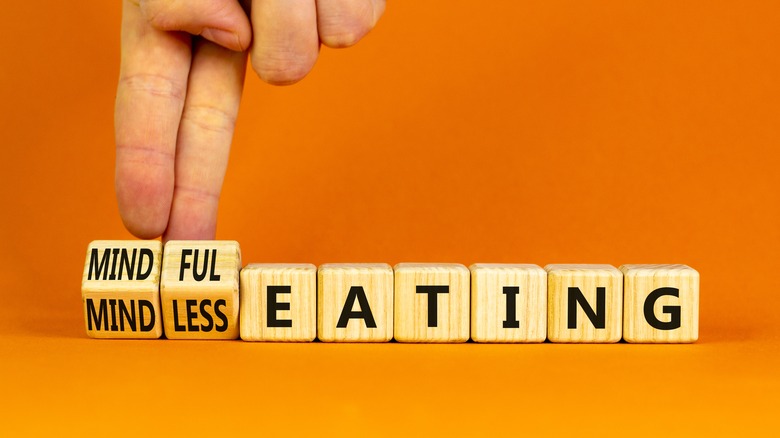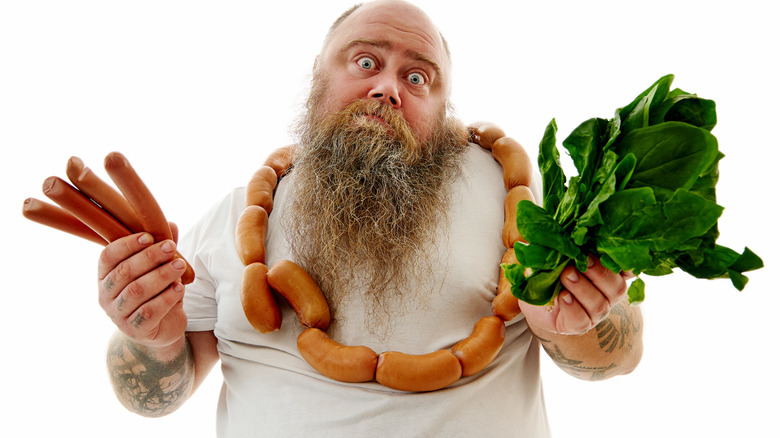Which Type Of Hunger Are You Feeling?
It's 3:28 a.m. Just an hour ago, a chorus of crickets gave an achingly enrapturing performance outside your bedroom window that had you hanging on every chirp, but even they have gone to bed now. Now, there are no sounds left to compete with the ceaseless, convivial chatter of the comedy podcast YouTube has been playing for what feels like an eternity.
Embittered by their sunny banter and the passel of restless hours you've spent staring at your ceiling fan, you throw yourself out of bed in a hough and begin to shuffle through the dark. Like one of those weird, robotic vacuums, you bounce off the hallway walls until you make it to the kitchen. Before your weary brain has time to catch up with your body, your arm reaches out — there's a quick yanking motion. You stare, eyes unfocused, into the bleak, bluish glow of the refrigerator light, and you ask yourself the age-old question: "Am I even hungry?"
Mindful eating and identifying hunger
Even though hunger is one of those things that seems like it should be pretty straightforward, in modern society, it has become shrouded in so much palaver and emotion that it can be hard to tell what we are really hungry for. The National Institute of Diabetes and Digestive and Kidney Diseases reports that 30.7% of Americans are overweight and another 42.4% are obese. The American Psychological Association states that 38% of adults say they have overeaten in the past month due to stress, and half of them report they engage in those behaviors weekly or more.
With numbers like those, it's no wonder the last few decades have seen a rise in terms like mindful eating and intuitive eating. They are practices designed to bring intention into our eating habits and disentangle us from the unhealthy beliefs we have about food. Michigan State University (MSU) researchers examined the seven kinds of hunger that Dr. Jan Chozen defined in her book, "Mindful Eating." Researchers noted that practicing mindful eating begins by identifying what kind of hungry you are.
Eye, nose, and mouth hunger
The first three types of hunger have to do with sight, smell, and taste. MSU describes how your eyes have the ability to override the information your brain is receiving from the mouth, stomach, and body. In doing so, your eyes' craving for beauty supersedes your body's lack of desire for food, and you start to feel hungry.
Your nose can play a role in hunger, too. The Nutritionist Resource describes that because taste and smell are closely related, the sweet, wafting smell of freshly baked cookies has the near-instant ability to make your brain think of eating — even if you were not hungry before.
Perhaps the most difficult kind of hunger to regain control over is mouth hunger. Years of eating mindlessly can condition the mouth to expect food far more frequently than the rest of your body. Healthline explains that there is a system in the brain designed to reward behaviors that contribute to survival. Because the tastes and textures of food are satisfying to the mouth, our brain releases dopamine — which we interpret as pleasure — and the reward system is triggered. Over time, more dopamine is needed to achieve those happy feelings, and the mouth believes more food will do the trick.
Stomach hunger
We're all familiar with the physiological signs of hunger, the loudest and grumbliest of which comes from the stomach. According to MedicalNewsToday, hunger pangs are a natural response to an empty stomach. However, an empty stomach doesn't necessarily mean your body is in need of food.
As it turns out, Pavlov's dogs are not the only ones who have been unknowingly conditioned. MSU reports that while most of us believe the stomach tells us when we're hungry, the exact opposite is true. Our eating habits have conditioned the stomach to expect food at certain times, and when it doesn't get it, that loud little organ can become quite demanding. My Simple Plate suggests that signs your body is actually ready for food include headache, low energy, a decrease in focus, and a drop in mood. Additionally, high levels of cortisol — the stress hormone — can play a role in increasing and decreasing hunger.
Cellular hunger
Cellular hunger refers to the hunger we feel when the body is in need of something specific. Nutritionist Resource describes how through cravings, our bodies can ask for nutrients we may have been missing in our diet. If you ever find yourself with a craving for steak that you just can't seem to shake off, there's a good chance your body might be looking for iron. A number of fad diets encourage people to significantly restrict — if not entirely cut out — certain food groups. This can lead to cravings for something your body needs that will not be satiated by any other type of food.
The Art of Mindful Eating states that, more often than not, when you find yourself facing cellular hunger, the essentials like water, salt, protein, carbohydrates, fat, and trace minerals (such as iron or zinc) will be the only solution for your persistent hunger.
Mind and heart hunger
Mind hunger is more like a mind game. According to Root and Branch, when hunger stems from the mind, it is really just a hodgepodge of everything we have been told by the world that we should and should not eat. It has little to do with what we want and need, and more to do with what we have been conditioned to believe about health and nutrition.
Heart hunger falls under the category of what some like to call "emotional eating." The hunger that comes from the heart often has very little to do with hunger at all. Mindbodygreen reports that heart hunger is often a result of filling a void. When we don't have control in some area of our life, we can control when and what we eat. When we long for love and connection that feels out of reach, warm, sweet cookies can bring us the comfort we can't seem to find elsewhere. However, anyone prone to emotional eating knows that the empty feeling isn't coming from the stomach at all. As always, reach out to your therapist or another healthcare professional if you feel like you struggle with emotional eating.






